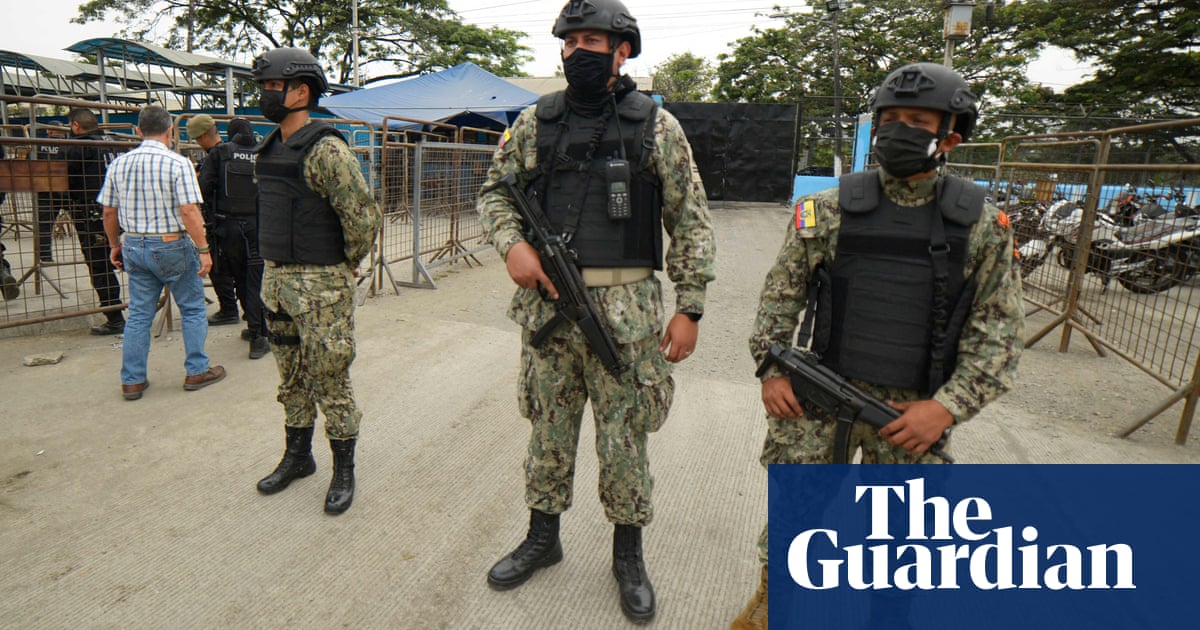Deaths at Litoral penitentiary part of wave of prison violence that has claimed more than 280 lives
At least 68 prisoners have been killed and 25 injured in a jail in the city of Guayaquil in Ecuador after bloodletting between rival gangs broke out on Friday night, the attorney general’s office said on Saturday.
The latest massacre occurred in the Litoral penitentiary, the same jail where at least 119 inmates lost their lives a little more than a month before in the country’s deadliest ever prison riot.
It is the latest bloodshed in a wave of prison violence in Ecuador this year which pushes the death toll to more than 280 inmates. The scale and savagery of the violence between rival drug trafficking gangs vying for control of prisons has stunned the country.
The latest carnage was no exception. Videos on social media purportedly posted by inmates overnight showed victims being beaten and burned alive in a prison courtyard.
Other videos showed detainees begging for help to stop the violence as shots and explosions rang out in the background. The Guardian could not independently verify the origin of the videos.
The outbreak was triggered by a power vacuum after a gang leader’s release, according to Pablo Arosemena, the governor of Guayas province where Guayaquil is located. “Other cell blocks with other groups wanted to subdue them, get inside and have a total massacre,” he said in a press conference on Saturday.
Ecuador’s president, Guillermo Lasso, took to Twitter on Saturday to lambast judges. He accused them of restricting the state’s ability to combat the violence by limiting a 60-day state of emergency in the prison system – declared at the end of September – which aimed to free funding and allow heightened controls with military assistance.
“The state’s fundamental duty is to guarantee the life of citizens, without discrimination. It is a fundamental human right,” Lasso tweeted. “Unfortunately, today that job has been made impossible by judicial decisions which impose exaggerated restrictions on the coordination between the state security forces to defend life. They do not allow us to defend life,” he said.
Lasso, a 65-year-old former banker, said the state needed the “constitutional tools to protect the population, retake order in the prisons and fight against the mafias that profit from the chaos”.
Col Mario Pazmiño, the former director of Ecuador’s military intelligence, said the latest violence demonstrated that the government was unable to “combat the threat which has spiralled out of control long ago”.
The violence spiked when local criminal gangs started working for the rival Mexican Sinaloa and Jalisco New Generation drug cartels, he added. “The level of corruption is so high that the prison staff and officers are totally corrupted and the prisoners run the jail,” Pazmiño added. “It is total chaos.”
The situation was worsened by an “inoperative justice system” which meant many prisoners were jailed before sentencing, Pazmiño said, leading to overcrowding and the mixing of highly dangerous criminals with prisoners jailed for alleged theft or drug use.
A total of 11 people were found hanged in the same prison in October. The authorities have said they may have been suicides.
Police operations since the state of emergency was declared – especially in the Litoral penitentiary – have uncovered stashes of guns, grenades, knives, munitions, mobile phones and drugs.
{{topLeft}}
{{bottomLeft}}
{{topRight}}
{{bottomRight}}
{{/ticker}}
{{heading}}
{{#paragraphs}}
{{.}}
{{/paragraphs}}{{highlightedText}}
{{#choiceCards}}{{/choiceCards}}





